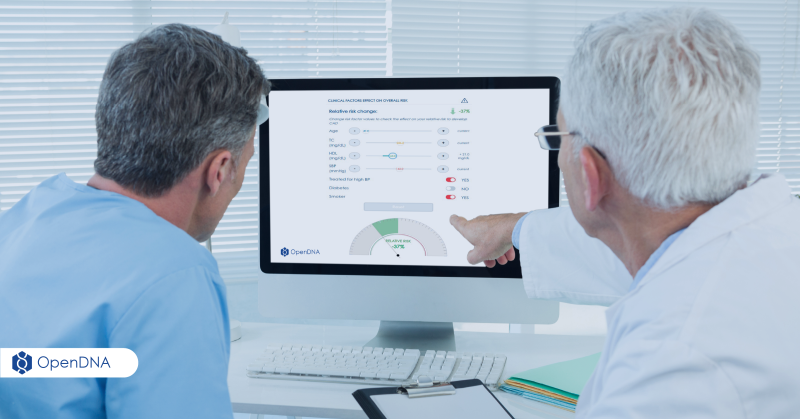
Open DNA
Using genetics and AI to prevent heart disease
139% of funding target
Highlights
Highlights
Innovative AI technology to prevent and treat the world's number 1 cause of death
OpenDNA has developed a unique technology that combines a genetic test with cloud-based technology that uses artificial intelligence to analyze the specific genetic and clinical data of each patient. The technology received a patent allowance in the US. Using advanced algorithms, this groundbreaking platform can predict if a person is at risk of developing CMS, and enables physicians to tailor optimal treatment for each patient. In the future, OpenDNA is looking to apply the technology to other disease states, such as cancer, autoimmune disease, and musculoskeletal disease.

Grants and investments by MindUP, Medtronic, IBM, Pitango, Rambam Hospital, and the Israeli Innovation Authority (IIA)
OpenDNA was established at the prestigious MindUP incubator, which specializes in digital health, and is led by investors such as Medtronic, IBM, Pitango VC, and Rambam Hospital. The company received a grant from the Israel Innovations Authority as part of its Incubator program.

A winning Team - Invest in the company of Former "Trendlines Medical" CEO
OpenDNA was founded by a team of world-class experts with decades of experience in medicine, genetic epidemiology, software, and medical devices, and an impressive track record of managing companies to the exit.
The company CEO and co-founder, Dr. Eran Feldhay (MD), has over 20 years of experience in medical software and devices. Dr. Feldhay was CMO of two medical AI companies, served as CEO of ApiFix and CEO of Trendlines Medical, and after the acquisition of his previous company Medcon, as GM at McKesson Israel.
The OpenDNA platform is based on the extensive experience and research of Dr. Evangelos Evangelou, co-founder and CSO of OpenDNA, a genetic epidemiologist and co-founder of the company, of the Imperial College of London, UK. The company's advisory board consists of many senior physicians in Israel and abroad.

Great market potential - Huge economic savings for healthcare providers worldwide
Cardiometabolic Syndrome is very prevalent, with around 1B patients suffering from it worldwide. The cost of treating this syndrome reaches hundreds of billions of dollars a year and constitutes a huge economic burden on patients, employers, healthcare providers, and insurance companies. OpenDNA's technological solution makes it possible to significantly reduce the costs of these diseases by enabling physicians, who are currently using trial and error treatment strategies, to identify risk factors early and optimize treatment, thereby providing better and precise care at a reduced cost.

Outstanding results in verification studies and major collaborations on the way in the US, UK, and Israel
OpenDNA has completed rigorous validation studies with excellent results after the platform accurately analyzed genetic and clinical data from a database of over 500,000 people. The company was also selected out of 100 candidates to pilot its product with one of the top medical academic institutions in the US and is also currently working with 3 clinics in the US, and several hospitals and clinics in the US, UK, Israel to conduct extensive pilots on three continents.
Pitch
Pitch
Precision Medicine is an emerging medical approach to the treatment and prevention of diseases, taking into account the individual differences in the genetics, lifestyle, and medical history of each person. This approach allows physicians and researchers to more accurately predict which prevention strategies and treatment plans for a particular disease will work in which individuals or groups of people. This is in contrast to the existing approach, in which disease treatment and prevention strategies are developed for the average person, with less consideration for the differences between individuals (for example – providing Metformin to all diabetes patients).

This medical approach has been gaining momentum in recent years, mainly due to the entry of genetic analysis, artificial intelligence, cloud technologies, and big data into the medical world. These enable the accumulation of medical data and the creation of large databases, as well as integration and analysis of data from various sources to optimize diagnostic, preventive, and therapeutic medicine.
The Need
Every year, nearly 20 million lives are lost to heart attacks. The metabolic syndrome that leads to heart attacks - diabetes, high blood pressure, obesity, and excess cholesterol, is the number 1 killer on the planet. These diseases are detrimental to the health and quality of life of billions of people worldwide and create high costs for healthcare providers and insurance companies.
However, unlike other diseases, which take their toll on the body over time, heart attacks can kill immediately without any warning signs. They may take time to develop and can be treated, but the symptoms are often undetected, and once it's happened, it is too late.
The good news is that many heart attacks are preventable if their causes are treated by lifestyle changes or medications. The problem is, often the diseases and symptoms that lead to a heart attack are not detected in time or do not receive quality treatment to prevent risk factors.
There is a real and clear need for a technology that can identify risk factors early and optimize treatment for each patient.
The solution - Optimized, personalized genomic-based treatment
Today we know that treating high-risk patients can prevent many heart attacks. The problem is that physicians are limited in their ability to identify high-risk patients since they don’t have access to genetic data. Combining clinical data with genetic data, heart attacks can be predicted with up to 85% accuracy.
OpenDNA has developed a unique AI bioinformatics platform that analyzes genetic and personalized clinical insights, such as risk prediction and recommendations for the best treatment for a specific patient.

The company has already implemented its AI solutions for the cardiometabolic syndrome, and in the future means to apply the technology to other complex polygenic disease states such as cancer, chronic kidney failure, autoimmune, neurological disease, and musculoskeletal disease.

The Technology
Since CMS, similar to most other chronic disease is affected by a genetic predisposition that is based on the cumulative effects of millions of DNA changes, special technology and research is required to create predictions that pertain to it. OpenDNA’s cloud-based platform can analyze millions of data points of genetic data to create polygenic scores that help analyze the individual genetic architecture of complex polygenic disease together with any type of relevant clinical data. The platform provides simple, actionable, and personalized clinical insights, such as risk predictions, personal recommendations for optimal diabetes or hypertension drugs for each patient. It makes this complex data accessible to any physician without special knowledge in genetics. OpenDNA is using the most advanced genetic algorithms as well as machine learning to provide outstanding results in validation studies. The platform is based on the extensive experience and research by Dr. Evangelos Evangelou, a genetic epidemiologist and co-founder of the company, from the Imperial College of London, UK, and Ioannina University, GR. Dr. Evangelou has published over 20 papers in Nature Genetics and has over 15,000 citations.
Unique benefits:
The OpenDNA developed the system from the ground up to answer the challenges of providing precision genetic medicine for complex diseases. It has several significant unique features:
- Only company to offer patented treatment algorithms as part of solutions (Allowed US Patent Application No. 17/020,002 – MACHINE LEARNING PREDICTION OF THERAPY)
- Processing of up to millions of DNA variations (SNPs) using multiple states of the art polygenic score algorithms
- Seamlessly combining genetic and longitudinal patient clinical data
- Rapid creation of new polygenic scores from GWAS studies
- Handle both genotyping and whole-genome sequencing data
- Unique treatment and pharmacogenetic algorithms
- Secure serverless, multi-tenant cloud platform
- Easy to use web-based GUI to be used by primary care physicians and other non-geneticists health professionals

How it works
The system uses a simple cheek swab to genotype the patient and uses the genetic data created for any future genetic analysis.

After the genetic data is uploaded, clinical information is imported from the EHR and is processed by the cloud-native platform. The output data can be sent back to the physician, EMR, and even the patients.

OpenDNA in the media:
Team
Team
|
Over 20 years experience in medical software and devices; CMO of 2 medical AI companies, served as CEO of ApiFix, CEO of Trendlines Medical and as GM at McKesson Israel after the acquisition of his company Medcon. Holds an M.D. and B.Sc. from Tel Aviv University and an MBA from Ben-Gurion University of the Negev.
|
|
Associate Prof of Clinical and Molecular Epidemiology. Imperial College London, UK and University of Ioannina, GR. Lead author of “Genetic analysis of over one million people identifies 535 new loci associated with blood pressure, Nature Genetics, 2018”, over 180 publications, over 15,500 citations and 20 Nature Genetics publication. Top 2.5% scientists WW according to ResearchGate
|
|
25 years of experience in software development. Software group leader in Bio-Rad for a protein interactions measurement device. Holds a B.S.C. in computer science, B.A in management from Tel-Aviv University, and M.A. in Philosophy from the Haifa University.
|
|
MD chief of the Department of Nephrology and Hypertension in Kaplan Medical Center, affiliated to the Hebrew University School of Medicine. He is the current President of the Israeli Society of Nephrology and Hypertension (ISNH). Dr. Chernin graduated from the Hebrew University School of Medicine in Jerusalem and subsequently received his clinical training at the Tel-Aviv Medical Center. He had a research fellowship period in the laboratory of Professor Friedhelm Hildebrandt in the University of Michigan, focusing on the field of monogenic proteinuric kidney diseases. His research interests encompass both the field of hereditary kidney diseases and the cardiovascular outcomes in CKD.
|



